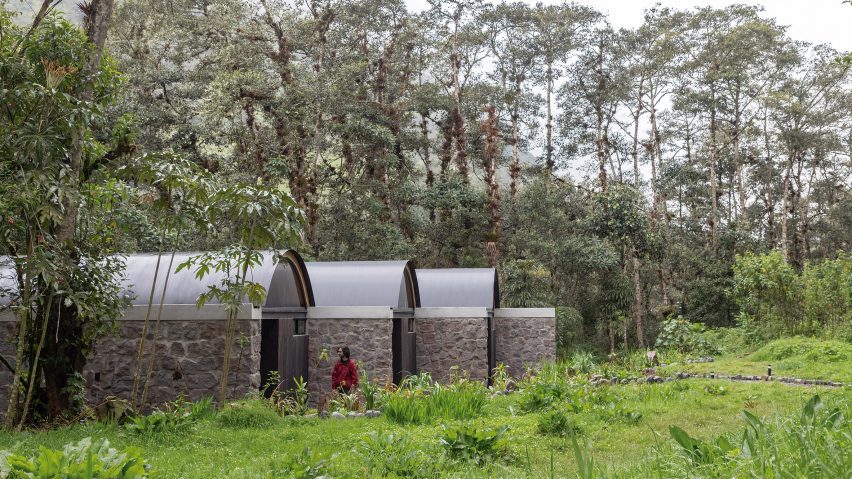Ecuadorian architects Ignacio Muñoz Bustamante and Javier Mera Luna have teamed up to expand a hotel with three new guest rooms constructed with metal vaulted roofs over stone walls in Papallacta, Ecuador.
Known as Las Pajareras, the guest rooms are part of Guango Lodge, a 300-acre (121 hectares) property between the Papallacta River and the Chalpi Mountain range that has been maintained and conserved by the same family for more than 50 years.
Located at an altitude of 2700 meters above sea level, the area is named for its resemblance to an Indigenous Ecuadorian braid (guango) due to several converging Andean mountain ranges and is a destination for bird watchers, photographers and conservationists.
Drawing on the general stylistic guidelines of the previous buildings, Las Pajareras was constructed to expand housing capacity with three rooms and a shared outdoor patio totalling 130 square metres (1,400 square feet).
An initial structure was constructed in the 1960s with load-bearing flagstone walls set on a thin concrete slab and topped with a vault system made of curved bamboo cane. Although no longer standing, the first building served as a model for a still-standing house constructed in 1996.
The second house is a two-storey longitudinal house with river stone walls supporting a long reinforced concrete vault. The ground floor holds a kitchen and dining area, while the upper level is composed of guest rooms under the wooden staves of the vault with small arched windows that look out on the surrounding forest.
Completed in 2024, the project incorporates the styles of the existing structures while "reinterpreting this construction system from a contemporary perspective, honor[ing] the memory and footprint of those who developed it," the team said.
Ignacio Muñoz Bustamante and Javier Mera Luna sited the building on a small strip of ground between the existing building and an oil pipeline, edging the three flexible modules along a ravine and orienting the units with views to the Papallacta River.
"The slightly offset positioning of the rooms from each other allows them to settle into the available space with a gesture of movement," the team said.
"Emphasizing the rhythm and repetition of the elements in each of the rooms allows and highlights the view and the relationship with the forest and the river, while at the same time generating privacy on each exterior porch."
South of the units sits a small patio with a bathroom block next to a trapezoidal pool.
The building is constructed of four materials. A cyclopean concrete foundation is topped with 60-centimetre basaltic stone walls secured with tie chains and a metal structure.
The structural walls serve a thermoacoustic function – using BIOM thermoacoustic insulation made from agricultural waste – and incorporate storage space for a fold-out bed.
The walls that separate the units hold a concrete "channel" that cantilevers over the river in order to divert water "back into the forest" and to support the prefabricated wooden trusses that vault over each room.
The U-channel provides a transition from the stone walls to modular prefabricated wooden trusses. The vaults are a sandwich of pine wood structure and 15-millimetre plywood – decorative on the interior and industrial on the exterior.
Above, the vaults are topped with waterproofing and black galvanized metal.
Additionally, the team installed a wastewater treatment plant for the entire lodge that returns water to its natural sources after use.
Other projects recently completed in Ecuador include a floating wooden house on the Babahoyo River designed by Natura Futura Arquitectura and Juan Carlos Bamba and a two-toned brick and stucco house in Quito by PJCArchitecture and Juan Pablo Ribadeneira.
The photography is by JAG studio.
Project credits:
Architecture: Ignacio Muñoz Bustamante, Javier Mera Luna
Construction: Ignacio Muñoz Bustamante, Javier Mera Luna
Collaborators: Hector Quilca, Josue Yanacallo, Xavier Navarrete, Diego Chaglla
Graphics: Ignacio Muñoz Bustamante, José Enrique Pérez

